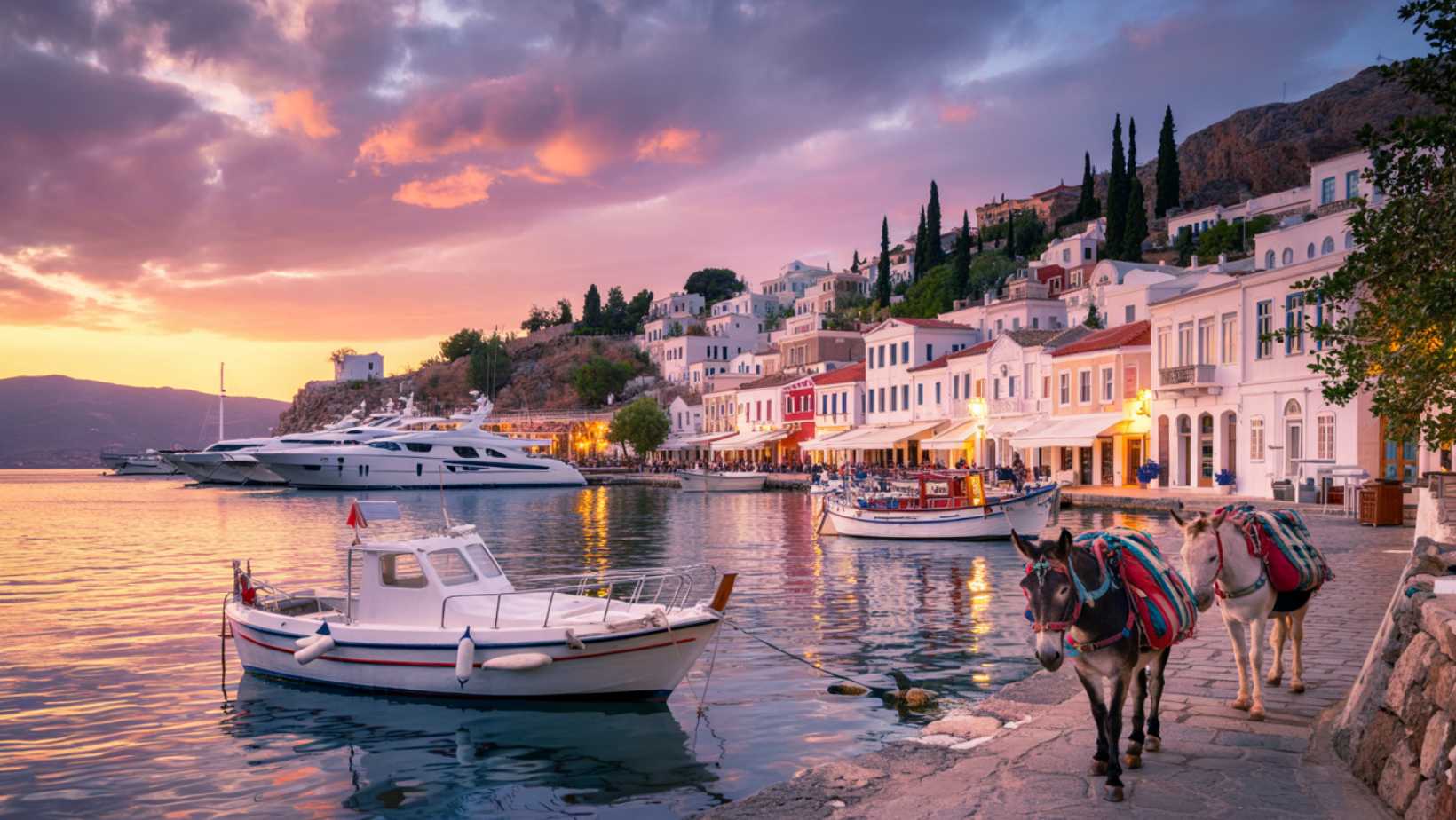The rhythmic clip-clop of donkey hooves replaces the usual hum of traffic on this enchanting Greek island. Only 30 miles from the bustling metropolis of Athens, time seems to slow down as you step off the ferry onto polished stone quays. The air carries a blend of salt, jasmine, and the occasional waft of freshly baked baklava from hidden bakeries tucked within labyrinthine cobblestone streets.
With its horseshoe-shaped harbor embraced by imposing stone mansions cascading down to azure waters, this Mediterranean haven offers a rare car-free sanctuary in our increasingly motorized world. The locals, just over 2,000 year-round residents, speak of their home with quiet pride, calling it “Greece’s best-kept secret” – though that secret is gradually being discovered by travelers seeking authenticity without sacrificing accessibility.
You’ll be stepping into an artists’ paradise where Leonard Cohen found his muse
The island’s magnetic pull on creative souls began decades ago when luminaries like Leonard Cohen purchased homes here in the 1960s. “The light does something to your perception,” explained Dimitri, a local painter whose studio overlooks the harbor. “It’s clearer, more intense than anywhere else—it transforms ordinary objects into something magical.”
Today, dozens of galleries and studios dot the main town and smaller settlements, showcasing everything from traditional Greek crafts to cutting-edge contemporary art. Many occupying restored captain’s mansions, these spaces tell the story of wealth from the island’s maritime past finding new expression through artistic patronage.
During summer evenings, impromptu music sessions often spill out from the harbourside tavernas, where you might find yourself sipping ouzo alongside internationally acclaimed musicians who come seeking the same creative inspiration that has drawn artists here for generations. The absence of vehicular noise allows these melodies to travel uninterrupted across the water, creating an acoustic experience that feels almost as magical as watching mountains turn rose-gold at sunset.
You won’t believe how swimming feels in these secluded crystal coves
Beyond the main harbor’s bustling energy lie dozens of hidden swimming spots accessible only by foot or water taxi. Plakes Beach, just a 15-minute walk east of the main port, offers smooth flat rocks perfect for sunbathing interspersed with crystalline pools ideal for floating. The water here is so clear that locals joke you can count the scales on fish swimming twenty feet below.
For true seclusion, hire a water taxi to Bisti Bay, where pine trees reach almost to the shoreline, providing natural shade that’s rare on Greek islands. The unusual geology here creates a perfect natural swimming pool effect with water temperatures slightly warmer than the open sea.
Unlike some remote islands with Caribbean-blue waters, these swimming spots remain remarkably uncrowded even in peak season. “We come here every Sunday during summer,” shared Maria, a third-generation islander spreading her family picnic. “The tourists usually stick to the beaches closer to town, so we often have this entire cove to ourselves.”
Your transportation options include friendly donkeys that know the way home
The island’s strict no-vehicle policy (with minor exceptions for emergency and utility vehicles) creates an environment where donkeys and human feet reign supreme. The 200+ island donkeys aren’t merely tourist attractions but essential transportation, particularly for moving goods up steep inclines. “My grandfather’s donkey carried everything from building materials to wedding gifts,” laughed Stavros, a donkey owner whose family has lived on the island for six generations.
These intelligent animals know the winding pathways so well that they can often find their way home unguided. Visitors can hire them with handlers to transport luggage from the port or for exploring more distant parts of the island, though most locals simply rely on their own feet for daily transportation.
The absence of cars creates an atmosphere reminiscent of medieval towns where narrow pathways and sudden staircases reveal unexpected vistas at every turn. The island’s soundscape—waves lapping against stone, distant church bells, conversations floating from taverna terraces—remains undisturbed by engine noise, preserving an acoustic environment increasingly rare in our modern world.
